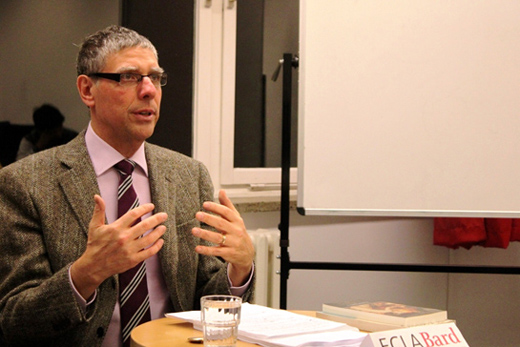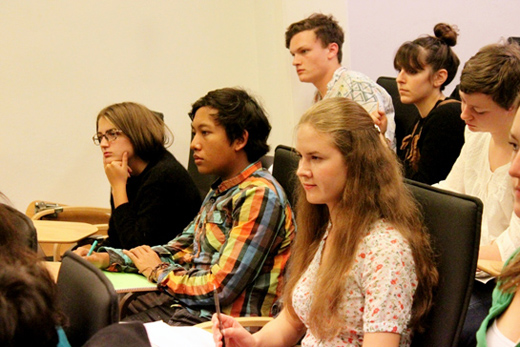
Evening guest academic lectures are always special for the ECLA of Bard community. Apart from presenting the students with the possibility to sleep longer and prepare better, they give a chance to hear some fresh thoughts on the familiar texts and participate in a vivid discussion with experts from the “outside”.
On the 16th of October ECLA of Bard welcomed Glenn Most – an American classicist and comparatist, well-known in Italy and Germany, who works as a Visiting Professor of Social Thought and Classics at the John U. Nef Committee on Social Thought (University of Chicago, US) and also teaches Greek philology in the Scuola Normale Superiore of Pisa (Italy).
Glenn Most arrived to Berlin to attend the international conference Modern Transformations of Euripides’ Bacchae, organized by Humboldt University. Since the Bacchae is a mandatory text for the AY/BA1 Core Course Plato’s Republic and Its Interlocutors, Glenn Most agreed to present a lecture at ECLA of Bard and clear the most challenging issues which students came across while reading the text.
“Don’t thank me by giving applause – thank me by asking hard questions. I can take it and I will be grateful for that,” encouraged the guest before starting. After a brief introduction about the key facts of Euripides’ biography and the history of the play’s creation, the lecturer went on to explain the main narrative strategies of the playwright.
According to Glenn Most, the Bacchae is full of plot patterns, which one can see in various Greek tragedies. For starters, the play explains how a certain political/religious institution (the cult of Dionysus) was founded. It establishes the connection between the world of tragic myth and the world of real politics, and also makes the ancient world myth more relevant.

Secondly, the god who is scorned avenges him or herself and punishes not only the non-believer, but also the innocent people around. In the Bacchae Dionysus is not taken seriously in the city of Thebes, and therefore doesn’t hesitate to make all its citizens suffer.
The third discussed pattern deals with the son, exiled from the family, who comes back from abroad to claim his rights. Dionysus arrives to Thebes from the other side of the world to show his power and become respected. Since Dionysus and Pentheus, the king of Thebes, are first cousins, this pattern deals with interfamilial relations and leads to strong tensions.
The conflict of antipodal concepts and phenomena is also crucial for the Bacchae. One can encounter numerous oppositions in the text – between Greeks and Asians, new and ancient gods, masculine and feminine characters, human and divine, tormentors and victims. In the play we see the tormentor who ends up being a victim – a man who pretends to be a god pretending to be a man. The characters of the play continuously change their roles and positions throughout the play, which relatively alters the readers’ attitude.
Outstanding conflict can also be noticed between the traditions of Christian and Greek pagan religions: while for Christians it’s important to have the god in one’s heart, in Greek tradition religious worship is rather a demonstrative ritual than a belief. Nobody cares what’s going on in one’s head as long as he/she acknowledges the importance of the divinity publicly.
The well-structured lecture was followed by questions about the text and the story of its creation. Students were interested in the savagery of women, the effemination of men and the presence of phallic symbols in the play, rating of Greek gods, comic aspects of the play and the bonds between Dionysus and the City (referring to the vision of the City role in Plato’s Republic).
Students of the Studio Theatre class wanted to discover more about the role of Dionysus in theatre performances. “Under normal circumstances you know who you are. If you start drinking you start playing roles, not necessarily theatrical, but of different characters. The mask helps you to hide your true identity and assume you’re someone else. The next step is being an actor without alcohol,” concluded Glenn Most.
After the lecture I personally started perceiving the Bacchae as the personal drama of a comparatively young god, who is betrayed by his family and is incredibly worried about his own prestige. Being less respected than a mortal cousin and being neglected by a couple of women, he decides to destroy his native city to prove his power, gain authority and coerce the people to worship him.
The conversation with Glenn Most provided a well-structured scheme of all the internal characters’ relations, of the preconditions and motives behind the play’s creation. And since The Bacchae is suggested as one of the topics for the Core Course midterm essay, such an overview might prove to be even more helpful.
